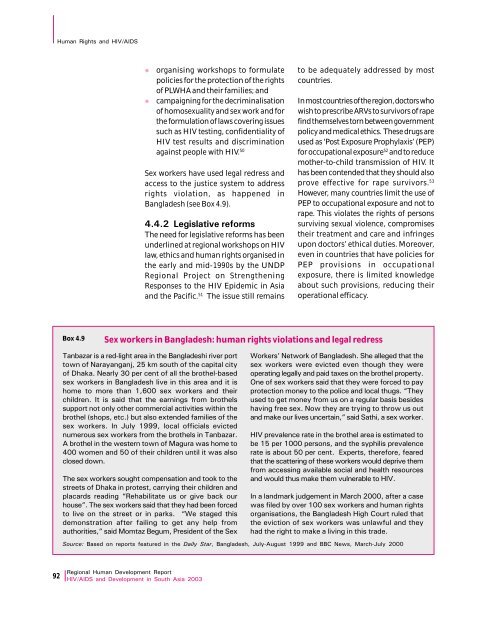Download Report - UNDP Asia-Pacific Regional Centre - United ...
Download Report - UNDP Asia-Pacific Regional Centre - United ...
Download Report - UNDP Asia-Pacific Regional Centre - United ...
Create successful ePaper yourself
Turn your PDF publications into a flip-book with our unique Google optimized e-Paper software.
Human Rights and HIV/AIDSllorganising workshops to formulatepolicies for the protection of the rightsof PLWHA and their families; andcampaigning for the decriminalisationof homosexuality and sex work and forthe formulation of laws covering issuessuch as HIV testing, confidentiality ofHIV test results and discriminationagainst people with HIV. 50Sex workers have used legal redress andaccess to the justice system to addressrights violation, as happened inBangladesh (see Box 4.9).4.4.2 Legislative reformsThe need for legislative reforms has beenunderlined at regional workshops on HIVlaw, ethics and human rights organised inthe early and mid-1990s by the <strong>UNDP</strong><strong>Regional</strong> Project on StrengtheningResponses to the HIV Epidemic in <strong>Asia</strong>and the <strong>Pacific</strong>. 51 The issue still remainsto be adequately addressed by mostcountries.In most countries of the region, doctors whowish to prescribe ARVs to survivors of rapefind themselves torn between governmentpolicy and medical ethics. These drugs areused as ‘Post Exposure Prophylaxis’ (PEP)for occupational exposure 52 and to reducemother-to-child transmission of HIV. Ithas been contended that they should alsoprove effective for rape survivors. 53However, many countries limit the use ofPEP to occupational exposure and not torape. This violates the rights of personssurviving sexual violence, compromisestheir treatment and care and infringesupon doctors’ ethical duties. Moreover,even in countries that have policies forPEP provisions in occupationalexposure, there is limited knowledgeabout such provisions, reducing theiroperational efficacy.Box 4.9Sex workers in Bangladesh: human rights violations and legal redressTanbazar is a red-light area in the Bangladeshi river porttown of Narayanganj, 25 km south of the capital cityof Dhaka. Nearly 30 per cent of all the brothel-basedsex workers in Bangladesh live in this area and it ishome to more than 1,600 sex workers and theirchildren. It is said that the earnings from brothelssupport not only other commercial activities within thebrothel (shops, etc.) but also extended families of thesex workers. In July 1999, local officials evictednumerous sex workers from the brothels in Tanbazar.A brothel in the western town of Magura was home to400 women and 50 of their children until it was alsoclosed down.The sex workers sought compensation and took to thestreets of Dhaka in protest, carrying their children andplacards reading “Rehabilitate us or give back ourhouse”. The sex workers said that they had been forcedto live on the street or in parks. “We staged thisdemonstration after failing to get any help fromauthorities,” said Momtaz Begum, President of the SexWorkers’ Network of Bangladesh. She alleged that thesex workers were evicted even though they wereoperating legally and paid taxes on the brothel property.One of sex workers said that they were forced to payprotection money to the police and local thugs. “Theyused to get money from us on a regular basis besideshaving free sex. Now they are trying to throw us outand make our lives uncertain,” said Sathi, a sex worker.HIV prevalence rate in the brothel area is estimated tobe 15 per 1000 persons, and the syphilis prevalencerate is about 50 per cent. Experts, therefore, fearedthat the scattering of these workers would deprive themfrom accessing available social and health resourcesand would thus make them vulnerable to HIV.In a landmark judgement in March 2000, after a casewas filed by over 100 sex workers and human rightsorganisations, the Bangladesh High Court ruled thatthe eviction of sex workers was unlawful and theyhad the right to make a living in this trade.Source: Based on reports featured in the Daily Star, Bangladesh, July-August 1999 and BBC News, March-July 200092<strong>Regional</strong> Human Development <strong>Report</strong>HIV/AIDS and Development in South <strong>Asia</strong> 2003
















